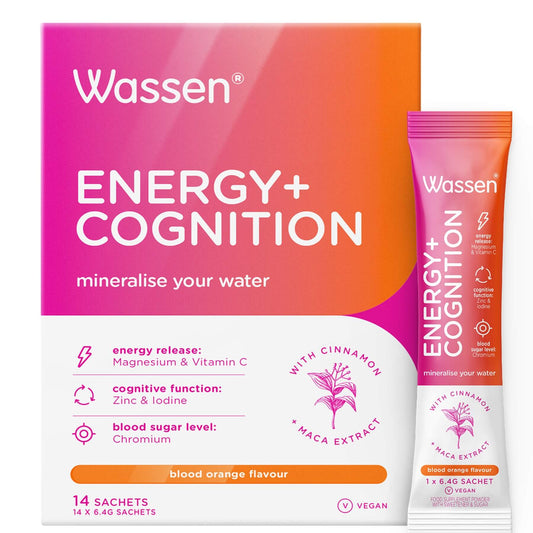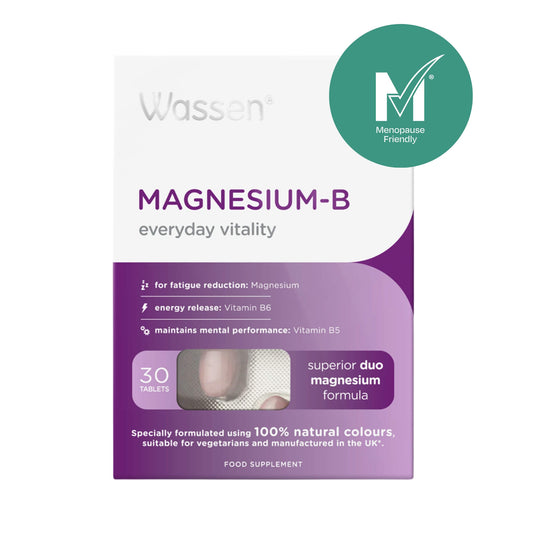Food choice plays a key role in sustaining energy. Food contains the calories metabolised by the body into ATP (adenosine triphosphate); the energy source that fuels cells. While calories are important for energy, specific minerals and vitamins are needed to facilitate the metabolism of food into energy. Getting enough of these essential nutrients helps to address fatigue, so supplementation can be beneficial in the diet to ensure an adequate intake.
What are tiredness and fatigue?
Fatigue is understood as extreme tiredness and a lack of energy, meaning the ability to perform physical and mental activity is in deficit. It relates to nutrient status, metabolism, exercise, inflammation, sleep and many body systems.
When you're tired or fatigued, your body's processes aren't functioning optimally. This can be due to various reasons, like micronutrient deficiencies, hormonal imbalances, or even sleep deprivation. These factors can lead to:
- Inefficient energy production: Even with enough fuel (food), the body might struggle to convert it into usable energy (ATP).
- Increased energy demands: Certain conditions or situations can create a higher energy demand, leaving you feeling depleted even if your intake is adequate.
- Disrupted energy utilization: The body might not be able to properly distribute and utilize the energy it produces, leading to fatigue in certain tissues.
Why supplements are best for energy, tiredness, and fatigue?
Magnesium-B combines Magnesium with 8 B vitamins, selected for their role in supporting the conversion of food to cellular energy in the body by:
- Supporting enzymes: Many micronutrients function as coenzymes, which partner with enzymes to enable vital chemical reactions in the body. These reactions break down complex carbohydrates, fats, and proteins from our food into simpler molecules the body can use for energy production. B vitamins are particularly important coenzymes in this process.
- Enabling cellular uptake: Some micronutrients, like magnesium, influence how cells absorb glucose (sugar), the primary fuel source for our cells.
- Regulating metabolic pathways: Micronutrients are involved in regulating the various pathways the body uses to convert food into energy.
The micronutrients in Magnesium-B:
Magnesium
Magnesium is the second most abundant mineral in the body and is involved in more than 300 enzyme systems, including pathways involved in cellular respiration, the process where glucose is broken down to generate ATP. Magnesium acts as a cofactor in energy-yielding reactions and contributes to a reduction of tiredness at fatigue.[1] The Nutrient Reference Value (NRV), meaning, the recommended daily intake an average person needs to remain healthy and prevent disease, for magnesium is 375mg per day.
Thiamine
Thiamine, also known as vitamin B1, contributes to normal energy-yielding metabolism, specifically carbohydrate metabolism. Thiamine pyrophosphate, the active form of thiamine, is a cofactor of several enzymes involved in helping the body's cells change carbohydrates into energy. Thiamine is also important for nervous system health (preventing beriberi), as well as the normal function of the heart.[2] The NRV for thiamine is 1.1mg per day.
Riboflavin
Riboflavin, vitamin B2, contributes to normal energy-yielding metabolism and to the reduction of tiredness and fatigue. Riboflavin acts as a coenzyme in many metabolic processes involved in energy production. When riboflavin levels are low, symptoms can include weakness and fatigue. Riboflavin is also important for the maintenance of normal red blood cells, which carry oxygen around the body.[3] Biomarkers, key biological molecules in the blood or other body tissues, of riboflavin deficiency include anaemia. The NRV for riboflavin is 1.4mg per day.
Niacin
Niacin, vitamin B3, similarly to Riboflavin, contributes to normal energy-yielding metabolism and to the reduction of tiredness and fatigue. Niacin helps create nicotinamide adenine dinucleotide (NAD) and nicotinamide adenine dinucleotide phosphate (NADP).[4] These coenzymes are crucial players in breaking down carbohydrates, fats, and proteins from our food. By aiding in these breakdown processes, niacin indirectly contributes to the production of cellular energy, ATP. The NRV of niacin is 16mg per day.
Vitamin B6
Vitamin B6, also known as pyridoxine, plays a role in energy formation and metabolism in the body. In its active form of pyridoxal phosphate (PLP), vitamin B6 contributes to normal protein metabolism by acting as a cofactor to enzymes involved in processing amino acids.[5] It is also involved in glycogen (the body’s storage form of glucose) metabolism and plays a role in breaking it down to produce energy when needed, and an indirect role in the synthesis of glycogen.[6] The NRV for vitamin B6 is 1.4mg.
Folate
Folate, also known as Vitamin B9, is another B vitamin which helps to reduce tiredness and fatigue. Folate is important for the formation of red blood cells, which carry oxygen around the body, enabling cells to generate ATP.[7] Low intakes of folate can lead to anemia, defined as lower red blood cell count, and can cause fatigue and tiredness. The NRV for folate is 200μg.
Vitamin B12
Vitamin B12 is the most widely discussed B vitamin playing a role in energy-yielding metabolism. In its active form methylcobalamin, it partners with enzymes responsible for breaking down fatty acids and some amino acids. This breakdown process releases usable energy units (acetyl CoA) that can be fed into the cellular energy production cycle. By enabling this breakdown, Vitamin B12 contributes to the body's ability to extract energy from various sources beyond just carbohydrates. It is also involved in red blood cell formation, with a deficiency in B12 being linked to a form of anaemia.[8] The NRV for vitamin B12 is 2.5μg.
Biotin
Biotin belongs to the B vitamin family where it is numbered as B7. It contributes to macronutrient metabolism enabling cellular ATP production. Like its sister B vitamins, biotin functions as a coenzyme precursor. In its active form, biotin helps create enzymes crucial for breaking down carbohydrates, fats, and proteins.[9] Biotin is also involved in the regulation of fat and carbohydrate storage in the body. The NRV for Biotin is 50μg.
Pantothenic Acid
Pantothenic acid, also known as vitamin B5, facilitates the metabolic processes that prevent tiredness and fatigue. Pantothenic acid acts as a cofactor in the synthesis of Coenzyme A (CoA).[10] This vitamin-like molecule helps to break down carbohydrates, fats, and proteins. By enabling the breakdown of nutrients and their transfer into the energy production pathway via CoA, pantothenic acid indirectly supports ATP generation. The NRV of pantothenic acid is 6mg.
[1] https://ods.od.nih.gov/factsheets/Magnesium-HealthProfessional/#:~:text=Magnesium%20is%20a%20cofactor%20in,%2C%20oxidative%20phosphorylation%2C%20and%20glycolysis.
[2] https://ods.od.nih.gov/factsheets/Thiamin-Consumer/
[3] https://ods.od.nih.gov/factsheets/Riboflavin-Consumer/
[4]https://foodandnutritionresearch.net/index.php/fnr/article/view/10299/16544#:~:text=Niacin%20is%20the%20precursor%20to,(nicotinamide%20adenine%20dinucleotide%20phosphate).
[5] https://www.ebi.ac.uk/interpro/entry/InterPro/IPR004569/
[6] https://ods.od.nih.gov/factsheets/VitaminB6-HealthProfessional/#:~:text=Vitamin%20B6%20is%20involved%20in,%2D2%20production)%2C%20and%20hemoglobin
[7] https://www.hopkinsmedicine.org/health/conditions-and-diseases/folate-deficiency-anemia#:~:text=Folate%2Ddeficiency%20anemia%20is%20the,body%20make%20red%20blood%20cells.
[8] https://www.mountsinai.org/health-library/supplement/vitamin-b12-cobalamin#:~:text=Vitamin%20B12%20works%20closely%20with,work%20better%20in%20the%20body.
[9] https://www.medicalnewstoday.com/articles/318724#benefits
[10] https://ods.od.nih.gov/factsheets/PantothenicAcid-HealthProfessional/#:~:text=The%20main%20function%20of%20this,protein%20%5B1%2C2%5D.





